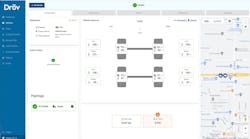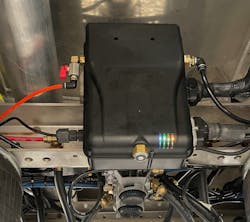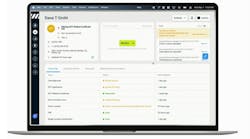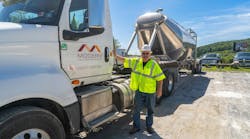Suppliers set sights on enhancing tractor-trailer connectivity
Once upon a time, truck and trailer equipment suppliers manufactured only hard parts. What was once considered off the shelf, more mechanical components and information have since shifted to today’s connected, data-driven ecosystem.
Commercial vehicle suppliers today are putting even more emphasis on connecting tractor-trailer data to create holistic units for fleets. They are also focused on the importance of integrating with existing fleet telematics software as well as offering turnkey solutions that might be a carrier’s first step toward a connected fleet environment.
Now available: 2022 Commercial Electric Vehicle Adoption Report
“When we look at the tractor-trailer relationship, the trailer has information and data both when it’s connected to the truck, as well as value when it’s not connected,” Mark Ehrlich, senior director of business development at Wabash, pointed out during Endeavor Business Media’s recent virtual CV Tech Conference, which was led by FleetOwner and other Commercial Vehicle Group editors.
When fleets are making decisions about spec’ing trailers and equipment given today’s abundance of technology options, David McKean, business development lead at Clarience Technologies, advised looking at a telematics system that is completely scalable. Road Ready, for example, is Clarience’s advanced telematics portion of the company that provides visibility into the health and location of fleet assets.
During the panel, Robert Brazeau, director of strategic initiatives for Meritor’s front-drive and trailer business, pointed out that the industry is focused on developing sensor technology and algorithms to thoroughly mine the data coming off fleets’ assets.
“Fleets need actionable data, and they need it boiled down to what’s really important,” Brazeau explained.
Historically, the industry has had an abundance of data on the truck side of the equation, Lisa Mullen, CEO of Drōv Technologies, told FleetOwner in a separate interview.
“But the missing link was the part that was carrying all the goods,” she explained. “Connecting those two is essential.”
When picking up and dropping off trailers, fleet managers today want to see that the vehicle picks up the right trailer and when it picks it up, explained Pete Jankowski, Drōv Technologies CTO.They also want to know that their tractor-trailer units are operating safely. That means using smart trailer technology to ensure that all tires are at the right pressure, that ABS systems and lights are working, and that trailer doors are secure.
“When you look at it holistically, those are one unit,” Jankowski told FleetOwner.
“What we see from our data is that sometimes the trailer moved, or drivers can’t find the right trailer,” he added. “One of the other issues we see is there are a lot of tire issues on the road. We have one fleet that gets a few million miles on select trailers of theirs, and they’ve had well over 100 major tire events, but we’ve gotten them off the road safely and not sitting on the side of the road with a blown tire.”
In terms of spec’ing new trailer technology, Mullen said Drōv encourages fleets to think about what their needs are now and what they foresee their needs to be in the future, especially when they start to think about autonomous technologies.
A diagnostics evolution
Leveraging connected technologies can help fleets become smarter and more specific about their condition-based maintenance practices, Drōv’s Jankowski pointed out.
“Our core feature set is being able to inflate and deflate the tires based on the load,” Mullen said of Drōv’s offerings. “We’re finding more and more fleets and tire companies becoming interested in that capability to precisely manage the tires.”
She added that is also true for the wheel-end package and monitoring its overall health.
“We feel that is the most important aspect of the trailer—the tires, the wheel ends, and the brakes,” Mullen said.
See also: Tethering device puts end to wheel-off accidents, inventor says
During the CV Tech panel discussion, Paul Washicko, VP and general manager of ConMet’s digital business unit, said the telematics industry is undergoing a natural evolution from its remote diagnostic origins some 20 years ago.
ConMet, a global manufacturer of wheel hubs, also launched its eMobility business in 2020 to help enable the development of electric vehicles.
“Over the years, we have developed and understand well what the thermal vibrations are for hubs that are beginning to fail and for bearings that are beginning to fail,” Washicko said. “This provides better utilization of equipment and drivers, and from preventing thermal events.”
ConMet is working on a second-generation prognostics algorithm that can detect a bearing problem even when it’s too early for a technician to detect something is wrong.
“We have all these different components that we put on the board, but the firmware and the expertise that we drive into that firmware is what allows us to see this so early,” Washicko explained.
“I am reluctant to say that because everyone has been promising it for a long time,” he added. “But we had a recent event where we saw similar signatures on a bearing failure, which was a flat-out bearing failure. When it was brought in for a PM, the technicians let it back out and we said, ‘You’ve got to bring it back in.’ When they brought it back in, they ended up averting a catastrophic event.”
When it comes to scheduling maintenance, Meritor’s Brazeau added that fleets will have to change their models slightly to make use of the data as it comes in. Part of that will mean a better understanding of how they can get the full life from their components.
“It also gives them the peace of mind,” Brazeau noted. “Each fleet has a different answer depending on their operation and where their costs lie. With the data we have now, we can help fleets improve their uptime, help with their operating costs, and when it comes to wheel-end componentry, we can apply data that will help make that vehicle safer on the road.”
Moving toward an EV—and autonomous—future
As commercial electric vehicles become more widespread, Clarience’s McKean believes telematics and vehicle connectivity will be that much more important—particularly when it comes to range management.
“It’s critical to know the weight in a trailer and what point in time so you can recalculate range, so the driver can get from Point A to Point B successfully or know if they need to get to a charging station,” McKean pointed out. “At the same time, connectivity is important on those electric CVs. If you can monitor tire inflation, for instance, and minimize rolling resistance, you will get more miles to the charge.”
At Drōv Technologies, Jankowski said the company has been adding more visibility, including enhanced camera technology, to its solutions. Drōv is also investing in improvements on weight estimations for fleets’ tractor-trailer units.
“We have been working on giving them visibility for the security of the trailer, so if something happens, they can go back and look at video,” Jankowski said. “Also, if they have some issues with getting the maximum load and the total gross weight of the whole vehicle—truck and trailer combined—we can help them get as close to 80,000 lb. as possible without going over.”
When discussing autonomous vehicles in particular, stakeholders agree that it’s critical for the entire industry to take all the appropriate actions and protocols so commercial vehicle systems aren’t hacked.When tractor-trailer units are pairing up, Jankowski noted, rolling automatic passwords and signals are hidden so others won’t see a Wi-Fi signal coming off the unit. All cellular data should be encrypted, he added, and saved in the cloud.
“Even if someone did get in, there are a ton of safety provisions included for not allowing them to do anything that would actually affect the vehicle,” Jankowski explained. “Let’s say somebody decided to turn all a trailer’s tires to 0 psi. The mechanical systems will fall back and do not allow the tires to go below a certain tire pressure.”
What if someone tries to hack into an autonomous system on a tractor?
“That to me is probably more key on where you really have your systems secure,” Jankowski said. “I know some of these autonomous systems have a manual takeover for a driver remotely, but on some of them, it could be good or bad depending on how they are secured.”






